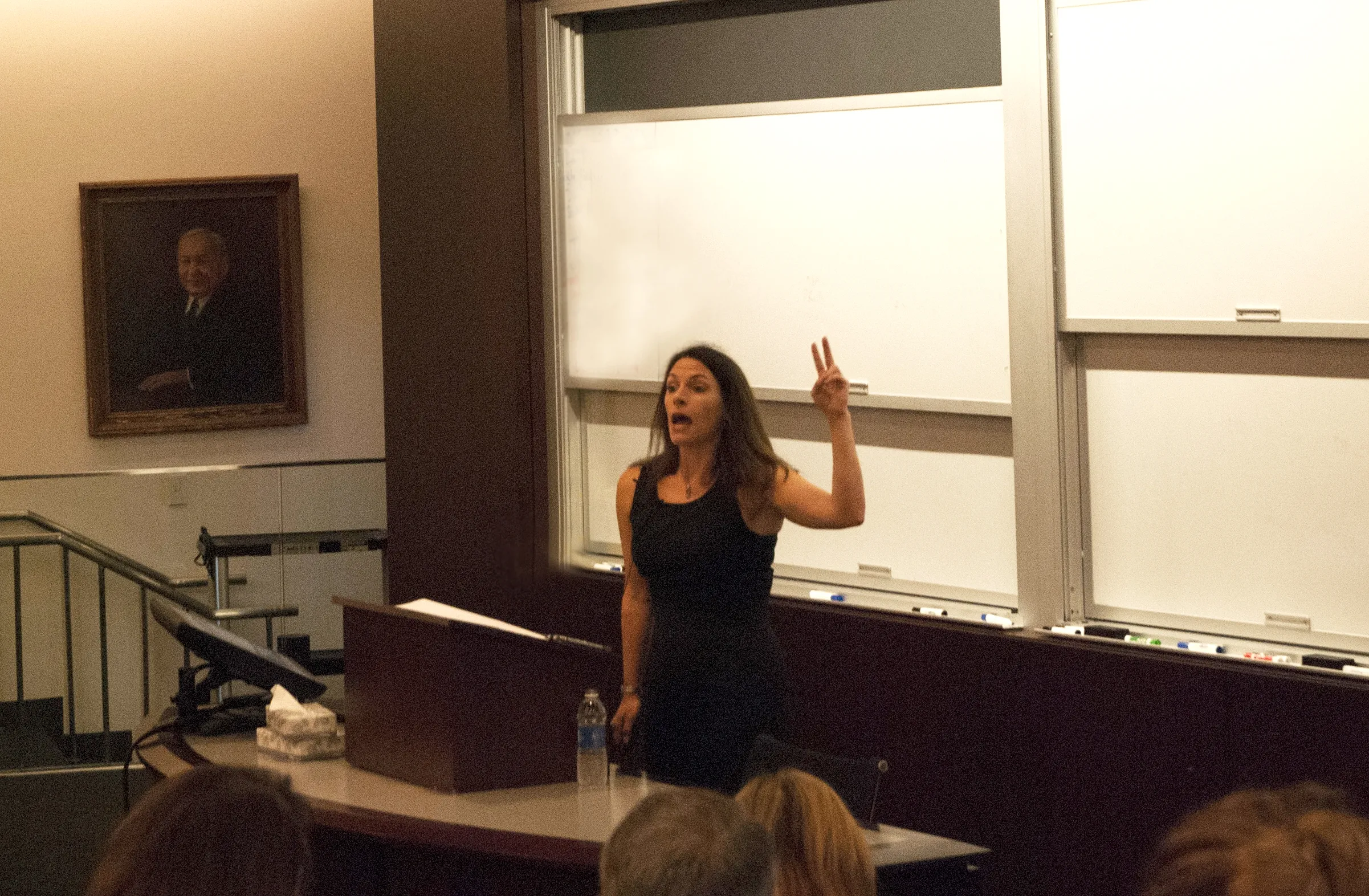Spring CBIs Offer Insights on Reasonable Expectations, Sentencing Guidelines, and the Psychology of Corporate Rights

The Law School’s popular “Chicago’s Best Ideas” series continued this spring with talks that explored the psychology of corporate constitutional rights, reasonable expectations in the law, and a judicial rebellion over federal sentencing guidelines.
Clinical Professor Alison Siegler, Director of the Federal Criminal Justice Clinic, kicked off the spring lineup by calling on the US Supreme Court to quell a federal appellate court rebellion that has hampered the ability of district courts to impose more lenient sentences and has encouraged judges to impose sentences within the federal sentencing guidelines. The courts of appeals, unhappy with limits on their own sentencing authority, have been overpolicing district court sentences that fall below the guidelines and underpolicing sentences that fall within the guidelines — actions that violate the US Constitution, Supreme Court precedent, and the federal sentencing statute, Siegler argued.
“It’s important for district judges to have the discretion and the authority to impose individualized sentences based on full and nuanced consideration of the characteristics of the defendant and the circumstances of the offense,” Siegler said. “We want district judges to have that authority — (they) are the ones who sit at the front lines. They have the institutional competence to play that role. They see and hear all the evidence.”
The rebellion, the latest in an ongoing judicial battle over who controls sentencing, has threatened what Siegler said is an appropriate level of district court discretion. In the past, the balance of power has swung to both extremes: during America’s first 200 years, district courts had total sentencing discretion, but between 1989 and 2005, they were sharply limited by mandatory sentencing guidelines. That changed with the US Supreme Court’s 2005 ruling in U.S. v. Booker, which gave district courts greater discretion to impose sentences outside federal guidelines.
“In my mind, the three eras of sentencing fit neatly into the 'Goldilocks porridge' framework," she said. "The first era was characterized by unfettered district court discretion and no appellate power to police; let’s call that the ‘too hot’ era. The second era was characterized by virtually no district court discretion and unfettered appellate power to police; I called that the ‘too cold’ era. The mandatory guidelines required judges to ignore all the complexity of human beings and the human experience and just reduce everybody to a range of months. The current, third era is characterized by substantial district court discretion and limited appellate power to police sentences — and, in my mind, this balance is just right.”
To illustrate the how the distribution of sentencing power impacts people, families, and communities, Siegler told the story of a clinic client named Brian, who had pled guilty to a nonviolent federal crime. A factory worker and single dad from Chicago’s Englewood neighborhood, Brian had overcome a tough childhood to become a volunteer football and wrestling coach for at-risk teens, one of whom later said that Brian had “taught me how me how to live my life.” But Brian was facing four years in prison under the guidelines — a punishment that Siegler and her students had argued would do more harm than good.
“After the judge came to understand Brian as a person … he sentenced him to probation,” Siegler said. “That was a year ago, and Brian is doing great. He has been promoted at work, and he continues to mentor the kids in his community. But if the judge had not had the power, the authority, and the discretion to impose a below-guidelines sentence in that case, it would have cost taxpayers $120,000 to incarcerate Brian for those four years. Worse still, Brian would have lost his job and his ability to support his family, his daughter would have lost her only parent, and his students would have lost their coach, who was keeping them on the right track.”
Aziz Huq: Hobby Lobby and the Psychology of Corporate Rights
Professor Aziz Huq, a Herbert and Marjorie Fried Teaching Scholar, took on a topic that incorporated both law and psychology, discussing an ongoing empirical study about how cases like Burwell v. Hobby Lobby have influenced public perceptions of both corporate constitutional rights and of the Supreme Court.
In a series of three studies, Huq and his collaborators — a psychology professor and a business professor — examined people’s willingness to grant privacy, religious liberty, and free speech rights within various business contexts and explored whether perceptions of corporate versus individual rights were influenced by political ideology. In their study, both liberals and conservatives tended to value individual rights over corporate rights, but liberals were more likely to see individual and corporate rights as being in conflict while conservatives viewed them as complementary.
The study, however, also offered the opportunity to examine how a particular ruling, such as the 2014 Hobby Lobby decision, impacts these perceptions. In Hobby Lobby, the Court for the first time recognized a for-profit corporation’s claim of religious belief, ruling that closely held corporations with religious owners cannot be required to pay for insurance coverage of contraception.
“The Hobby Lobby opinion was a couple of months away, and we thought this was an opportunity to look at whether the Supreme Court, by issuing a ruling, can influence what people believe about a question that is, in one sense, legal — but in another sense is normative,” Huq said. “It’s a belief that isn’t predicated on certain facts about the law, or facts about the world; it’s predicated on people’s beliefs about what’s right or proper.”
When they examined the data by ideology, the scholars found that conservatives became more supportive of corporate religious liberty after Hobby Lobby, and liberals became much less supportive. Conservatives also became more supportive of the Court, indicating that they felt a stronger obligation to obey the ruling, and liberals became less supportive. They became more skeptical, less trusting, and more likely to see bias, Huq said.
“The obvious takeaway is that the effect of a Supreme Court ruling is contingent upon your ideology,” Huq said. “It’s not the case that people are passive recipients … If you’re inclined to agree with the Court ex ante, as we know conservatives were pre-Hobby Lobby, you are likely to feel confirmed and justified by the Court’s ruling. You’re likely to hold that same normative view, but more deeply.”
But if you don’t agree with a decision, he said, “you’re likely to double down whatever view it was you initially held.”
Richard Epstein: Reasonable and Unreasonable Expectations in Property Law and Beyond
In his CBI talk, Richard A. Epstein, the James Parker Hall Distinguished Service Professor Emeritus of Law and Senior Lecturer, discussed the notion of reasonable expectations in law and argued that, contrary to the conventional wisdom, the doctrine is best used when its main purpose is to facilitate cooperation. He discussed a number of applications in areas ranging from property rights to search and seizure to privacy, emphasizing many of the limitations.
For instance, the idea of “reasonable expectations” often produces a circular argument: “The effort to say that we can figure out the use of reasonable expectations to determine what the legal boundaries are is a mistake because once you know what the law is, the only reasonable expectation you have is you either comply with this thing or something goes wrong with it,” he said.
In property law, the notion of reasonable expectations has come into play when applying New York City’s Landmarks Preservation Law, which empowers the city to designate, and regulate, certain properties or neighborhoods as historic. In the landmark 1978 case Penn Central Transportation Co. v. New York City, the owners of Grand Central Station, who had been denied the right to construct a building over the terminal by the city’s Landmark Preservation Commission, claimed they were entitled to use that airspace and that denying that use constituted an unconstitutional taking of state-protected air rights. The Court rejected their claim, saying that the regulation didn’t interfere with what it deemed the “primary expectation” that the terminal could continue in its present use; nor did it prevent the owners from realizing a reasonable rate of return on the initial investment.
But this application of the doctrine failed in a number of ways. Most notably, it did not maximize overall social welfare, Epstein said.
“What the doctrine of reasonable expectations is designed to do is to tell each party, either public or private, the way in which he has to behave such that if the other fellow behaves in a complementary fashion, the situation will produce optimal results for both of them,” Epstein said, noting that there are many examples of such cooperative behavior in both law and in social practice.
For example, if two people are having a conversation in a public park, it is reasonable to assume a certain degree of privacy — for instance, that others nearby will not deliberately eavesdrop. But it is also reasonable for those others to expect that the two won’t talk so loud that others can’t help but overhear, he said. That form of cooperation should be possible between all random pairs of individuals, given the applicable social norm, he said.
In cases like Penn Central, the “series of judicially imposed expectations … are profoundly unreasonable because they are separated from a system of property law, which encourages divided interests. Nor does that system relate to the fundamentals of cooperation,” he said.
What we want to, he said, “is go to an area where expectations are reasonable precisely because … the law is trying to understand how people maximize their joint welfare through cooperative behavior.”


